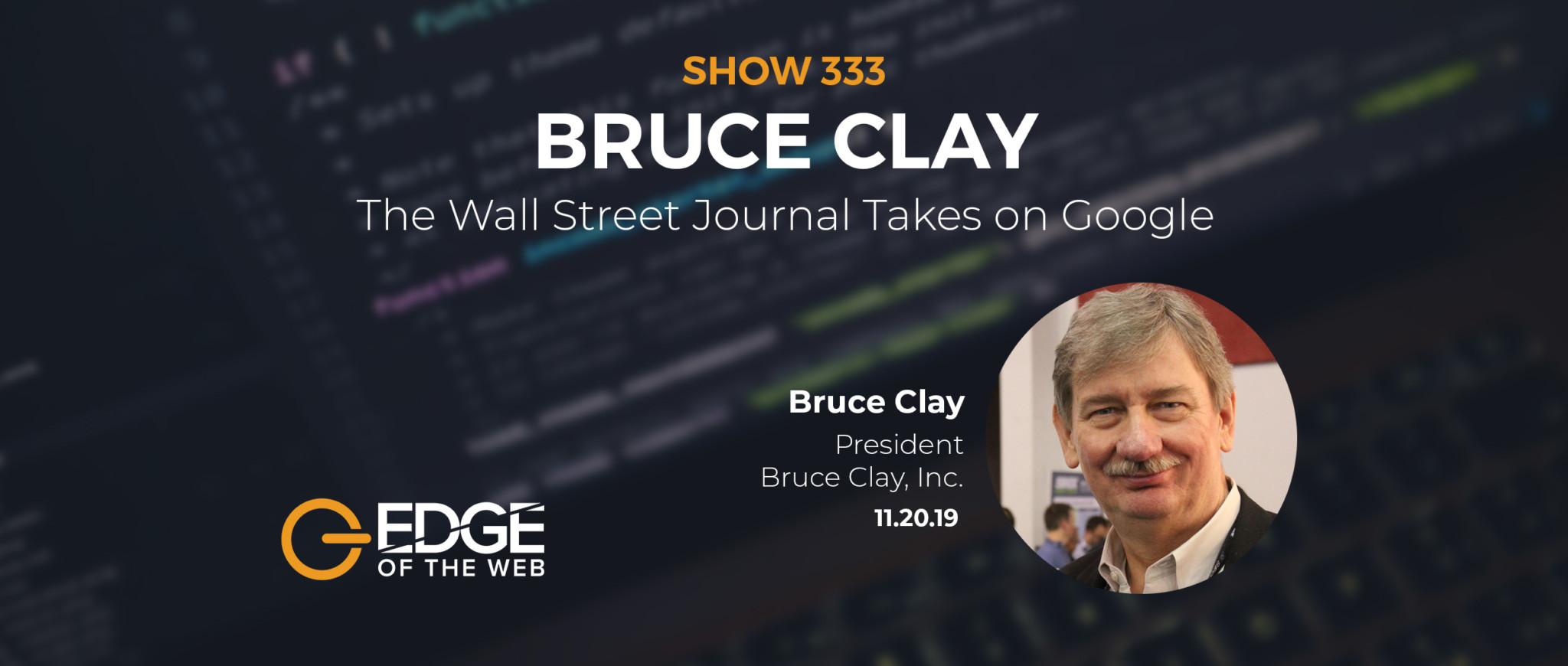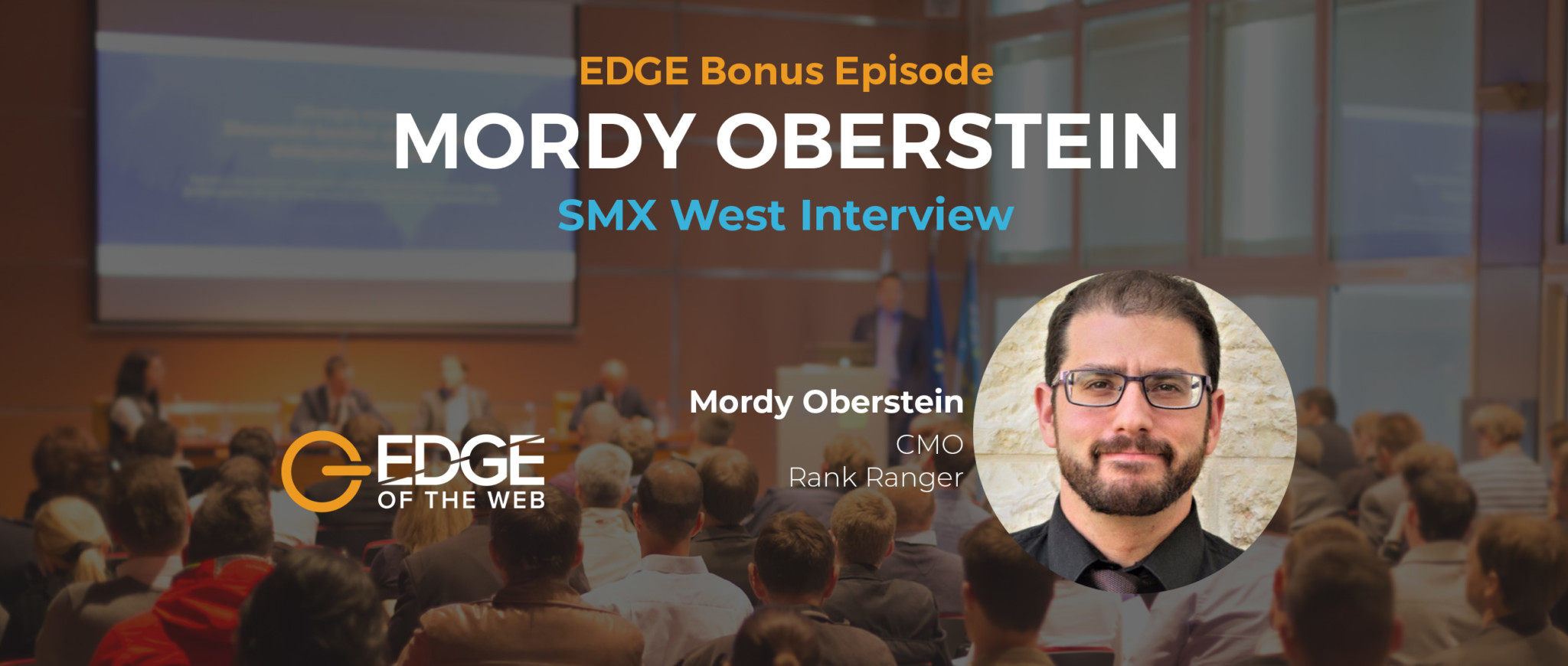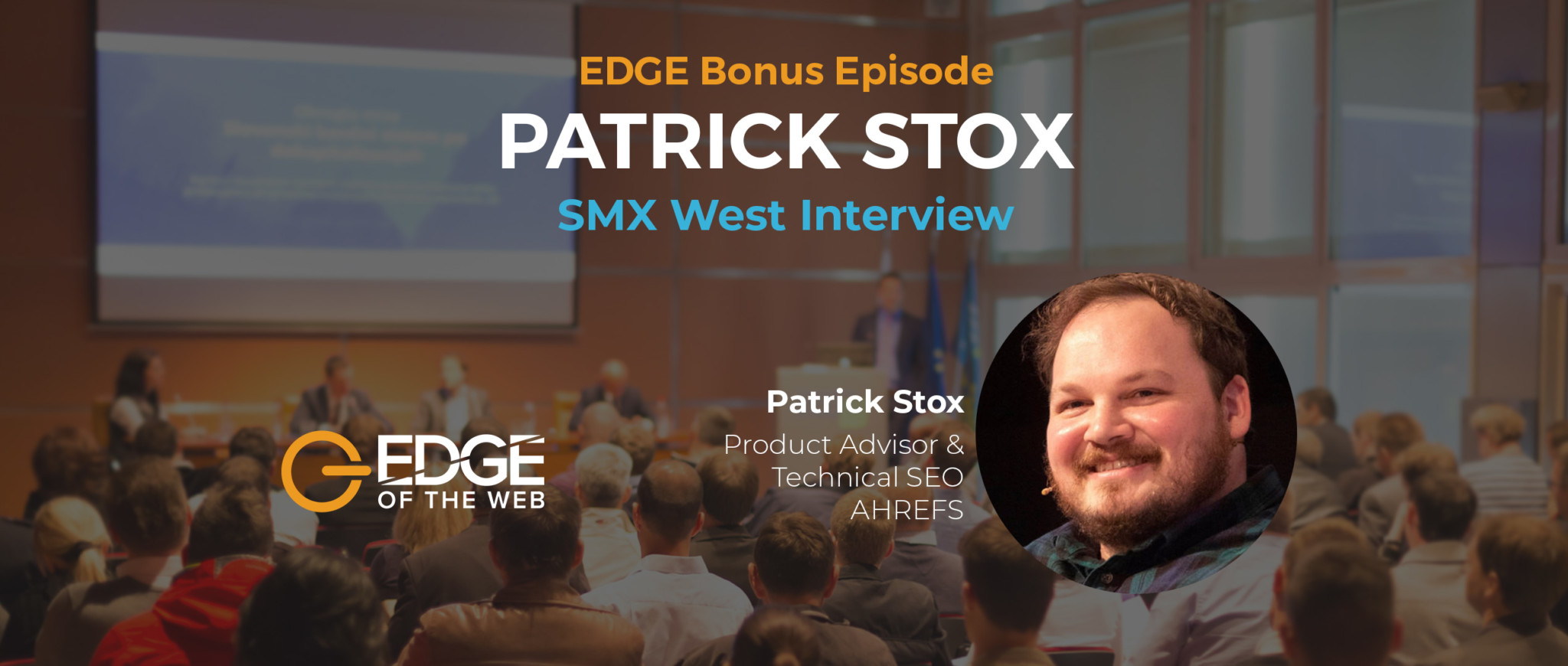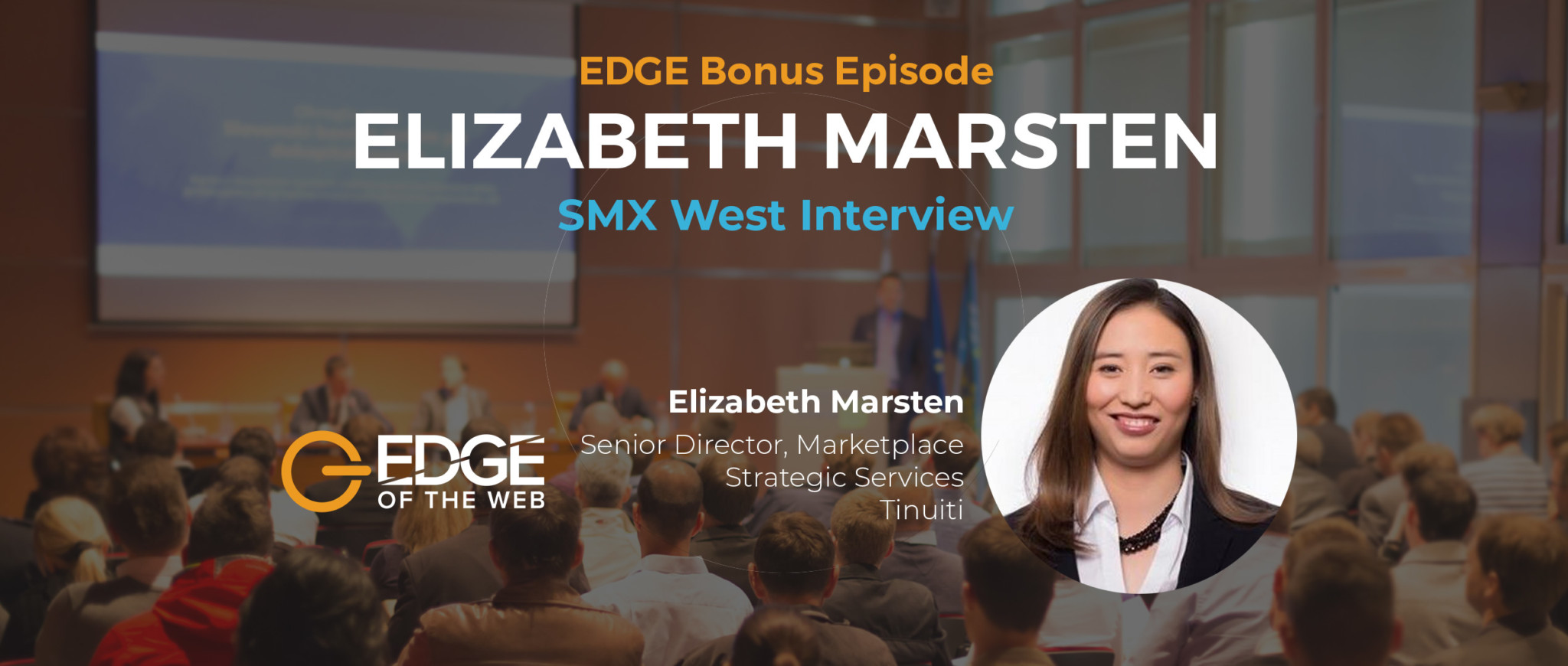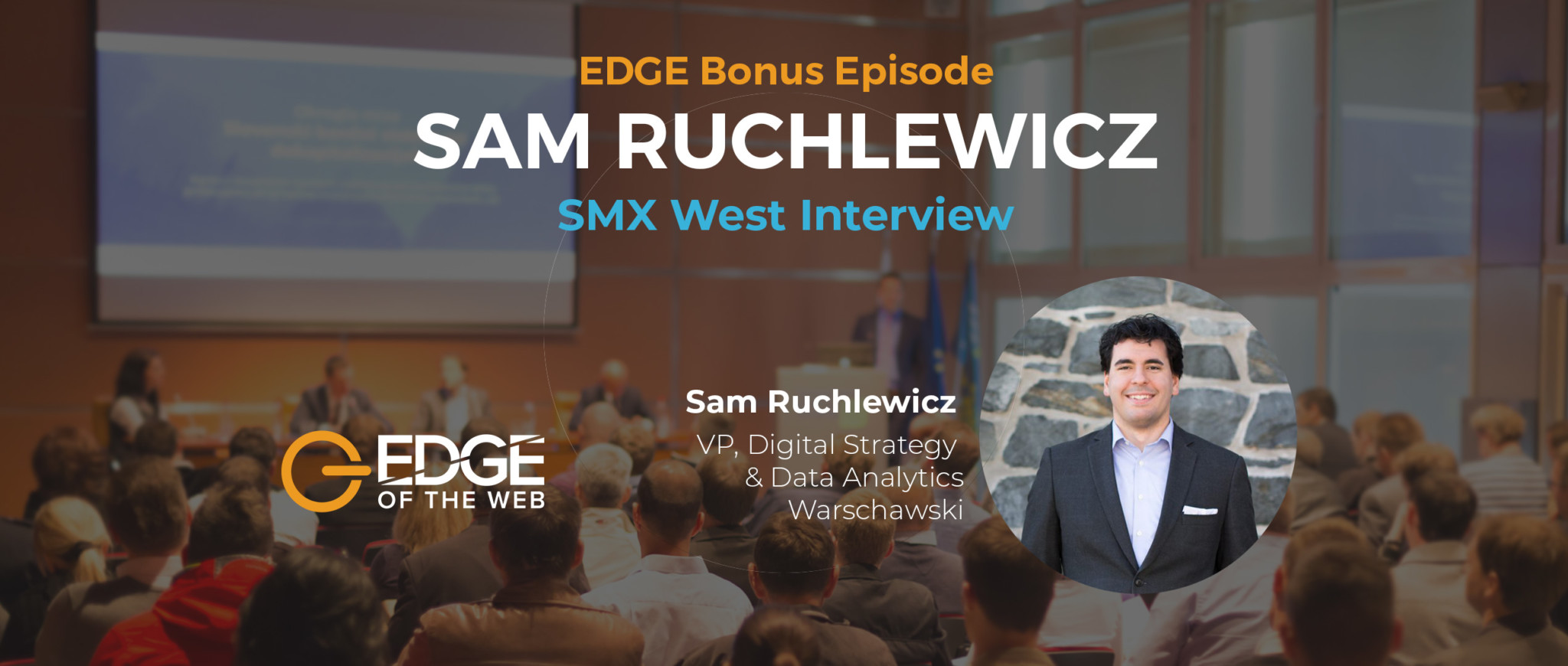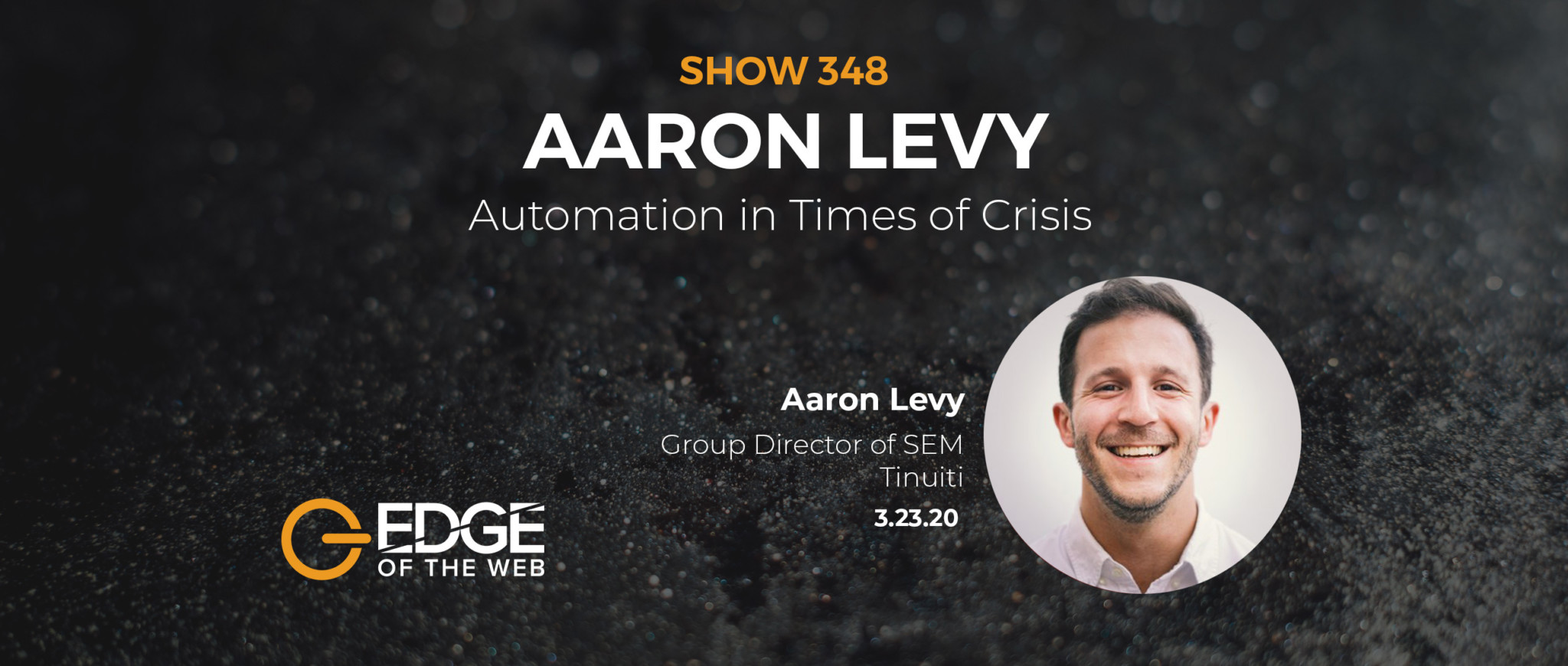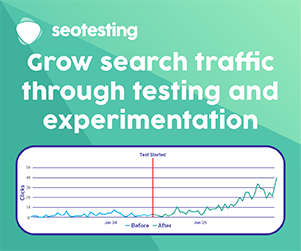Announcer: 00:01 On this episode of Edge of the Web.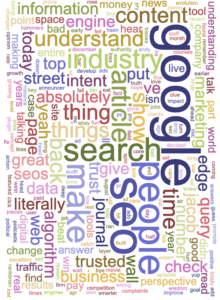
Bruce Clay: 00:04 Up until last year, August of last year, Google hasn’t had the power to do that. Now they’re getting it debugged and I’m expecting that what we’re going to see is a great amount of leap forward in presenting proper results.
Announcer: 00:22 Your weekly digital marketing trends with industry trendsetting guests. You’re listening and watching Edge of the Web, winners of Best Podcast from the Content Marketing Institute for 2017. Hear and see more at edgeofthewebradio.com. Now, here’s your host, Erin Sparks.
Erin Sparks: 00:43 So this Edge of the Web radio, episode 333. I’m your host, Erin Sparks. Every week we bring you amazing industry guests to chat about trending digital marketing topics and marketing news. We unpack topics for our digital marketing audience. Be sure to check all the recent shows at edgeofthewebradio.com, that’s edgeofthewebradio.com. We’re cranking out podcasts, videocasts, blog content, social, all in the space to be able to give you as much content as possible as we talk to some fantastic marketing influencers from around the planet. You want to deep dive into each and every show. We have our news, podcasts as well as our interview podcasts. So check that out.
I’d like to introduce our producer in the studio, who has just unmuted his mic. That’s Jacob Mann.
Jacob Mann: 01:32 Yeah, now you’re watching me, dude.
Erin Sparks: 01:34 In my periphery [inaudible 00:01:35] quicker. Jacob, how you doing, sir?
Jacob Mann: 01:38 I’m doing all right.
Erin Sparks: 01:39 Excellent, excellent. Appreciate the cut. You’ve got a new haircut there, man.
Jacob Mann: 01:44 Yeah, yeah. We were at a conference last weekend so I had to make sure I look nice. I was presenting, did a little talk about SEO stuff.
Erin Sparks: 01:52 Yes, you did.
Jacob Mann: 01:53 Yeah, went really well.
Erin Sparks: 01:54 Very cool. [crosstalk 00:01:55] Had a few good points come out of the office. Did you shock and awe them? [crosstalk 00:02:00] Did you scare them?
Jacob Mann: 02:02 I think I scared them, but that was the photos I was putting up. I had a picture of me on the beach in a donut floatie just flexing. I made that as part of my presenting because why not?
Erin Sparks: 02:18 And you were representing us at the time. That’s fantastic.
Jacob Mann: 02:21 Hey, it made them laugh and it made them pay attention, so it’s all good.
Erin Sparks: 02:24 All right. Some edge notes, some housekeeping, we want to cover real quick. We’re really geared towards SEO. We’ve been doing this for the last quarter of the year, our episodes have been focused more and more. And we had a great interview with Andy Drinkwater, when we unpacked the 209-point SEO audit checklist. We’re really excited about what we did with that interview, so we swung around and we want to bring our live SEO audit to your YouTube channel. You got to subscribe to us and be able to jump in and watch what we’re going to be doing here. We’ve had a couple bobbles, not bobbles. Andy’s been sick and we want to make sure that he is up to his utmost of SEO proficiency whenever we go live. So next next Wednesday, the 27 … Is it next Wednesday? Not next Wednesday? Yeah, it’s next Wednesday, the 27, at noon. Everybody is actually shaking their head sin there but I read the bloody thing.
Jacob Mann: 03:18 27 it is.
Erin Sparks: 03:19 27 at noon, we’re going to go live auditing a site live. We’re going to be able to unpack it and use all of our different tools. You’re going to have a great experience, I guarantee it. What could go wrong there? So check it out and make sure you set a reminder, either ring the bell, smash the bell as they would say, boy, I sound like an old fogey. Smash that bell, get a reminder whenever we go live. Hey, do some lunch, have some SEO audit time with us.
Want to let you know who’s coming up on the show. Kim Scott’s returning to the show next week if I’m not mistaken. Elizabeth Martzen is also joining us on December 2. Talia Wolf is coming on December 9 and Robert Rose is joining us at the end of the year, December 16. Again, you want to make sure that you get reminded of those live shows.
All right, if you’re getting all the traffic that you want you can certainly not look at this, but hey, for Ahrefs, as a continued sponsor of the show, we certainly want to provide you some great information about their service. You can look at top features like understanding your competitors’ top pages and what keywords rank for them as well as the type of traffic they’re getting. So it’s a great analysis tool to be able to deconstruct your competitors’ SEO and use it against them. In all positivity and clean competitiveness. So check out ahrefs.com, that’s A-H-R-E-F-S.com. Sign up today for a free trial. You’re going to swim in great data. We love the tool here at the shop, we really, really do. We look at it literally daily. So check them out, we certainly appreciate them as a continued sponsor of Edge of the Web.
All right, so without further ado, let’s welcome you back to the show. Again, I’m Erin Sparks, this is Edge of the Web radio. This is episode 333, and every week we’re bringing you amazing information and top industry guests as it applies to trending and digital marketing topics. We went through our news. If you missed our news podcast, you certainly want to jump in there and download that for all of our iTunes listeners. But, for right now, let’s take a deep dive with trending topics with this week’s featured guest.
Announcer: 05:37 Now it’s time for Edge of the Web featured interview with Bruce Clay, President of Bruce Clay Incorporated.
Erin Sparks: 05:43 All right, so we have the deep voice guy introducing Bruce Clay. We’re honored to be able to have Bruce on our show. It’s been a long time of mine to be able to talk to Bruce. He’s the SEO expert, the father of SEO so to speak, and a lot of reference. Bruce Clay is the Founder and President of Bruce Clay Inc., a global search marketing optimization firm providing SEO, PPC, social media marketing, content creation and SEO tools, just want to make sure you got an asterisk there, and education. The company has locations all over the world, including USA, Australia, Japan, India, Switzerland and Dubai.
Bruce is known as the father of SEO. He speaks at leading industry conferences. He has spoken over 300 times at these conferences and conducts a lot of training courses for students worldwide. He’s been featured in various publications as the Wall Street Journal, USA Today, PC Week, many more. So, Bruce, again, welcome to the show, sir.
Bruce Clay: 06:46 Thank you. Thank you very much.
Erin Sparks: 06:48 You’re more than welcome. So, Bruce, there’s your bio, your official bio, but I really want to hear from you, how in the world did you get into SEO when you did?
Bruce Clay: 07:00 Well, you got to remember I started back in January of 1996. For those of you who can remember that far back, that’s when Al Gore invented the internet.
Erin Sparks: 07:10 In his lock box.
Bruce Clay: 07:16 Somebody said maybe it would catch on. I had decided I wanted to try to switch into a consulting business. I hadn’t really done it. I had always had jobs, even though they were pretty high powered jobs, I wanted to try consulting. And I thought this internet thing would be about like that. That I would have the ability to work out of my home, notebook, computer, Corona and a beach. Work where I want, when I want, do all that stuff. My background is I have a bachelor’s in math and computer science and an MBA. Marketing, programming and along comes the internet.
Search engines are, of course, software. They’re algorithms. So I went out and said, “Okay, I could fix this. I could solve it. I can find out what that software is actually looking for and make it right.” And it took a week to figure it out. Well, remember, I started three years before Google.
Erin Sparks: 08:26 Yup, absolutely. You were optimizing towards AltaVista and Yahoo for that particular durat-
Bruce Clay: 08:34 AltaVista, Excite, Infoseek. Yahoo was still a directory back in the day. We went out and, when I say we, it was me when I started this thing, I created a little website and I got optimized and suddenly people started calling me. Okay, and I hired two people. Then more people called me so I raised my price. Then more people called me and I hired two more people and had to move out of the house. It was literally like that. I found space and it kept growing and growing and growing.
Then along comes Google and, of course, that was somewhat disruptive but equally it promoted SEO. And it really was a catalyst for a lot of growth. Back then the conferences were just starting, Search Engine Strategies was one of the bigger ones, and it was interesting enough. Back then Danny Sullivan pulled all of the top SEOs together to speak at his conference, and all six of us sat as one round table in the bar. It’s the kind of thing that if there was an earthquake the entire industry would have been wiped out. That’s what it was like when it started. It was, quite frankly, compared to today, horribly primitive.
Erin Sparks: 10:11 It’s almost like you were on a foreign planet, like astronauts so to speak, as opposed to wild West. Wild West was the 2000s, but literally that was almost like you were in a foreign land, right?
Bruce Clay: 10:24 Yeah. Literally I could add a couple keywords, put it in the title, put it in the description, submit it and two minutes later you’re at the top of the first page.
Erin Sparks: 10:35 If it was only so easy.
Bruce Clay: 10:38 Well, I’ll tell you, when it started it was that. But the thing that flipped it over and helped us all, the entire industry as agencies, was that not a single client understood it. So a lot of the initial growth was really I could hire somebody and train them to do it, and in three months, maybe six, at the outside, my employee knew more than all of the clients. Because the clients didn’t know what they were doing. So we were finding ourselves very early on as being where they had to go to be able to compete, and that really drove the industry in the early days. That really, really was compelling.
Then, fast forward 10 years, and the conferences have been training people, I have training courses of my own, tools are starting to show up on the market and people start thinking that they know how to do SEO. Well, after five years of doing SEO perhaps, maybe a couple, they’re going to know more than anybody I could hire in six months. So it became a problem for agencies where you either had to find a client that knew nothing or you had to develop a senior staff.
I think that’s where we see the actual fracturing to some degree of our industry. There are a lot of experts out there that I respect, that you’ve interviewed, that know what they’re doing in SEO. But if you compare it to the total population of the people claiming to be SEOs, it’s a fraction of a percent.
In my case, I decided that the only way for me to compete is to have an entire company where every consultant had 10-plus years’ experience, 16-plus is our average. So I decided to go top shelf, and as soon as that happened I limited my growth but it also moved me into the category of servicing larger clients.
Erin Sparks: 13:00 Right, enterprise-level SEO.
Bruce Clay: 13:03 Then we ran into a problem. I’m giving you the whole story here.
Erin Sparks: 13:06 No, it’s all right, keep on going.
Bruce Clay: 13:08 Then we ran into a problem where even the enterprises had their own teams in-house. So they weren’t really motivated to hire an agency. The only reason they would is if they didn’t have the resources. [crosstalk 00:13:24]
Erin Sparks: 13:24 Or perhaps that they failed in what their execution was. Then you have some begrudgingly colleagues that would not really want to have your input, so to speak. Not to put words in your mouth but, yeah. If you’re brought in, you’re doing surgery on something that somebody screwed up on.
Bruce Clay: 13:48 Correct. That’s exactly it. Today, probably most of the people that come to us, we’re their third or fourth SEO company.
Erin Sparks: 13:59 Yup, got it.
Bruce Clay: 14:01 They stumble, they fall, they try it again, then they decide they’re just not going to do it again, it’s too costly.
Erin Sparks: 14:10 No, I understand. Quick note, if I could, want to remind our iTunes subscribers to rate this show and let us know what you think about this, as we have interviews like Bruce and other marketers that are top shelf marketers, to Bruce’s point. We want to make sure that we get the word out about what we’re doing in this industry and how important it is to pay attention and educate yourself to be that senior staff that Bruce is talking about. So make sure you rate and review if you could. Sorry for the gratuitous plug, Bruce, but go ahead.
Bruce Clay: 14:43 No, give me more.
Erin Sparks: 14:46 All right, hey, your time in your industry, you were one of the earlier pioneers. Let’s talk about the efforts that you’ve seen in the improvement of search results. We’re going to unpack this to a greater degree here, but we mentioned just briefly all of the old search engines that didn’t make the cut. There were so many that are gone, Lycos for example. I’m just going through my Rolodex of all these search engines. That’s a natural evolution of any particular product is if you don’t have the stamina, you don’t have the particular talent, you’re going to disappear into the ether. But what have you seen over the last two decades that are monumental shifts in how we search?
Bruce Clay: 15:37 Well, so I’ll go back to the beginning. The how we search part, it used to be that somebody would put in a query and they would actually go down many five pages, and if they didn’t find what they want, they switched to a different search engine because they believed that they knew what they wanted and the search engine just didn’t have the answer.
Erin Sparks: 16:00 Wow.
Bruce Clay: 16:01 In today’s world, people will do a search, and if the top of the page, above the fold, in the Google search results does not address their particular query, they actually change the query.
Erin Sparks: 16:18 That’s a huge change right there.
Bruce Clay: 16:20 Right. So a good example is we had a case where for the word cars, our client was number one, they fell to number two. But almost all their traffic disappeared. And the reason was the entire top of the page was a Walt Disney movie.
Erin Sparks: 16:39 Absolutely.
Bruce Clay: 16:39 So people would search for cars, they would see a Walt Disney movie, that would be the entire top of the page. So instead of drilling down to the car sites, they would just go change the query.
Erin Sparks: 16:52 That’s very interesting because the real estate changed because the intent of the entire consumer audience was bifurcated basically. They split because some of the intent was looking for that movie.
Bruce Clay: 17:04 Right. Now Google has also implemented three other things, I think, that actually impact that. One is a query deserves diversity. It used to be if you search for something, Google would take the most likely answer and give that to you. But in some cases there’s too many answers. For instance, where I’m at in California, if you search for hammer, the number one result is the Armand Hammer Art Museum, number two result is a vitamin, number three result is MC Hammer. Normally I would say that’s not a hammer, but that’s relative to me. But in Google’s word, there are too many hammers. There’s pianos have hammers and guns have hammers and museums. So diversity is their response. So they give you a little bit of everything and that has totally changed from the early days, where whatever had the most keywords on it won. So that’s a big change.
I think that the second thing that’s a big change actually is RankBrain. With RankBrain, it attempts to figure out what the intent of the query is, whether it is transactional like shopping or informational or even navigational. How do I find or things like that. The results actually get biased. People who used to rank very, very well for a particular keyword, but they were a shopping site, suddenly vanished. And they didn’t vanish because their SEO was worse, they vanished because Google thought that the intent of that head term was informational. So the transactional site got pushed down.
Erin Sparks: 19:09 Exactly. And that’s right there what I wanted to really unpack. It’s the perspective of loss. Google is constantly changing how it understands intent, and it’s not a perfect engine obviously and it gets things wrong as it’s actually understanding and putting together the science behind intent, understanding and content evaluation for that intent. So they have a tough job because the consumer is constantly moving, we have a moving target on the consumer and their savviness of how to actually search, which is also a complete connection to the engine itself and how trustworthy the search engine is. But they also are building a model in flight, in the airplane, of how to actually infer these things.
BERT, the recent algorithm, just came out of literally the “Transformers,” understanding the linkage between different terms based on the intent words, like to and not and these type of factors. They’re getting better and better at understanding them.
Bruce Clay: 20:21 I think that one of the things that we have to recognize just in general, at least this is my observation, is it almost becomes a self-fulfilling prophecy. If RankBrain thinks that everybody wants information sites, so they present information sites, by definition everybody wants information sites because that’s all you can click on. So there is an issue where ultimately the search engine isn’t going to be able to represent the fringe, if you will. Hopefully not lunatic fringe but the fringe. That some of the sites that actually might appeal to that query, it’s possible that they will never appear for that query. That, I think, is a particular problem that we have to pay attention to.
Erin Sparks: 21:12 All right, so you’ve teed it up to me strong enough to be able to dive into the Wall Street Journal article. Let me introduce to our listeners and our audience who have not come across it, the Wall Street Journal article was actually published November 15, by Kristin Grind, Sam Schechner and Robert McMillan and John West. So the article was, “How Google Interferes with Its Search Algorithms and Changes Your Results,” and the sub-headline was, “The internet giant uses blacklists, algorithm tweaks and an army of contractors to shape what you see.” So this article raised ire from a bunch of SEOs in the industry, we talked about that here earlier, and the assertion is that this article is poorly researched and even to the degree that it is embarrassing on behalf of the Wall Street Journal. So, it’s a sizable article, 23 pages like I said.
But as we’re talking about this type of echo chamber and this perspective of ranking and a loss of ranking, because SEOs are constantly looking at rank performance, we are dealing with a moving target where the engine itself is trying to understand intent. There’s a huge perspective and those fringe elements, potentially who are making assertions that the company has agenda. Are we really talking about how people are looking at their own results, almost like a reflection based on a fluid mirror?
Bruce Clay: 22:47 Well, I have a very strong opinion about the article in general.
Erin Sparks: 22:52 Yeah, give us your take.
Bruce Clay: 22:54 I think that news sources look for some form of sensationalism in and of itself. I think that there’s a lot of ways that you can spin any number of things, and I found myself going through article paragraph by paragraph and saying, “I understand what really happens, this is just fun.”
Erin Sparks: 23:14 Absolutely.
Bruce Clay: 23:15 I’ll give a good example of a possible spin, not even on the article, but if you and I were in a race and you won, what I could say is, “I came in second and you came in next to last.”
Erin Sparks: 23:32 Absolutely.
Bruce Clay: 23:33 Right? And I’d be right.
Erin Sparks: 23:34 It’s all about … Yup.
Bruce Clay: 23:36 But the implication is I beat you. In this particular case, having an army of quality reviewers that have their core mission to improve the overall quality of search results is hardly what I would call under the table blackhat action.
Erin Sparks: 23:58 They ascribe them to be low paid contractors that also were not being listened to by Google. Yeah, you better believe that was a spin. Go ahead.
Bruce Clay: 24:07 Yeah, okay, so everybody working for the ASPCA is obviously a low paid volunteer, therefore they’re terrible people. So when you look at what’s actually going on, I think that there’s a large infrastructure required in order to improve quality. I think that trust of quality is the number one battle throughout Google today, and I know a lot of people have talked about expertise, authority, trust and trust is a particular item. But for the last year-and-a-half, Google has finally been able to figure out with artificial intelligence whether sentiment is positive or negative, whether people actually are supportive of you or whether they hate you. Up until the last year, August of last year, Google hasn’t had the power to do that. Now they’re getting it debugged. I’m expecting that what we’re going to see is a great amount of leap forward in presenting proper results.
For instance, if I were to walk up to my phone and ask it a question and it gave me an answer, that answer was wrong and it was not trusted just because it ranked, who loses? I would lose, Google would lose, everybody would be harmed, confidence would drop. But if Google finds that this is a spammer and I am not going to let it be number one and I am going to intervene until we develop the software to catch it, I think that’s totally within Google’s realm. But the way it was written was somebody was caught, they were taken out, they fixed it, they went back in and that’s evil. I’m not positive that’s the case.
Erin Sparks: 26:04 It is just perspective. And to the degree you’d want somebody working on your behalf to do just that. And Google’s trying to continually build trust of that consumer.
You just mentioned something, it dawned on me, is that consumers have a level of expectation absolutely, but there’s a perfect case study of how people are allowing for a software to mature, that’s the in-home smart speaker. Is that how many times do we get a bad result back and accept it and say, “All right, it’s just not there yet from understanding exactly what I’m asking for.” So voice search is by its very nature demonstrating that consumers are letting it incubate. They know that this thing is going to evolve into a much better technology, but it’s trying to get smarter, it’s trying to develop.
So we’re in full acceptance that that’s happening and the same thing applies but we’re just further down the road with Google. That process happened. It had to get smarter and along the way there are so many inferences in this article that, again, with one perspective it could certainly be spun that way. For example, eBay was a reference in that, losing substantial rankings over time. Guess what? There’s a lot of different algorithm changes that every site was exposed to, and a lot of big sites besides eBay also dropped.
Breitbart released a video about execs of Google upset about the Trump win and they said that they got it buried and page 12, but then as soon as they complained about it, internal Googlers complained about it, it rose to the top. As well as Dealcatcher, another example of a company that lost 90% of its traffic but then got it back. All these things are perspectives from those individual companies. You got to prove the data, you got to be able to prove your case, not just sit from one angle and say, “This hurt me, therefore you must be doing something bad.” Sorry, I was on a rant there. Go ahead, Bruce.
Bruce Clay: 28:16 Well, I’ll go back to an old example. At one point, BMW got caught keyword stuffing their pages and Google took them out of the index. But a day or so later, Google put them back in the index but just for the word BMW, because it was a bad user experience to search for BMW and not find it. So if eBay came back, it may be that it only came back for branded terms. I don’t know that. But it would be a bad experience to search for a brand and not find the brand.
I believe that Google in general has never ever expressed any caring about whether you rank organically or not. Their algorithm doesn’t care because they make no money on organic. I don’t think they take people out just to hear complaints. I think they take people out because there’s a good reason to have them come out. And that would be a manual action and the rest of it is the algorithm.
But I’m a programmer, I’ve been programming for years, and I know every once in a while you make a mistake. You use a not instead of the positive. You don’t do it quite the same way and every once in a while something doesn’t work the way you think. Or you have what’s referred to as a corner case, where it works 99% of the time but that one case doesn’t work. Or there’s co-dependency and you have five variables in the algorithm, and if all five behave a particular way, then there may be something that happens. It’s hard to guess those.
We just have to understand Google is an evolving piece of software for the most part, and their entire goal is to present trusted valuable accurate information to consumers on the result of a query to a level where people will click on an ad.
Erin Sparks: 30:31 Absolutely. That’s their goal.
Bruce Clay: 30:35 Fundamentally, ask your audience, everybody out there, raise your hand if you believe that Google’s in the business of making money. [crosstalk 00:30:43] if you’re in the business of making money.
Erin Sparks: 30:46 Exactly, there we go.
Bruce Clay: 30:48 Quite frankly, I think that people who make money don’t deliberately hurt their own reputation.
Erin Sparks: 30:56 You don’t crap in your own nest. Forgive my expression but that’s the thing is that they’re not going to deliberately alienate, it could be argued, half of their audience for a political agenda where they’re going to lose half of their revenue by doing so. We were talking about this before the show and right before the show, Bruce, you and I were talking, is that they’re in the business of developing trust of the engine, that’s the core concept that they’re constantly striving for. So if they’re screwing that up then they have to have their own governance internally if they are doing that.
The article even referred to what Google has done, they’ve hired two main political advocates, one on the left, one on the right, to field complaints from these different politically leaning groups to field any type of complaints. It’s not one way, it’s two ways. They’re in the business of understanding what’s happening in these spaces and the article does make a lot of assertions towards political bias, outside influencer bias and the utilization of blacklists. That’s all subject to perspective. You’re talking about the core principle of this company, any company, they got to make money. Why would they do that?
Bruce Clay: 32:22 I think that one of the things we should also pay attention to in the area of trust, is let’s supposed I’m a medic site and we know there was an update in August of 18. I am trusted. I am a doctor, I am a leader in my industry, I teach at all the universities, I am a leader. But somehow, in my website, which was built by somebody who works for me, who’s not a doctor and somehow they said, “Hey, we can make money running ads on our website,” and they put an ad on the side of the page that happens to be paid for by somebody not quite so trustworthy. Suddenly that biases my site as being not trustworthy.
Erin Sparks: 33:05 A direct association.
Bruce Clay: 33:08 Direct association. You’re going to play in the mud, you’re going to get dirty. Quite frankly, I think that a lot of people never understood that. They don’t understand that I have to behave in a trusted way in order to be trusted. They think that I’m trusted therefore I’m trusted, not I’m untrusted because of what I do.
Trust is a difficult thing to understand sometimes. Trust isn’t on page, expertise is on page. Trust isn’t authority, that’s whether other people who are trusted think you’re trusted. Trust is where the entire consumer industry behaves as if you’re not trusted, bad reviews, or where it’s far more complicated would be I link out and that neighborhood I link to is untrusted. There’s different things that are trust signals, and I think that Google cannot give untrusted answers. Especially if voice search, where they’re only going to give one answer, that one answer better be trusted.
I think we see, as an industry, that SEO is actually extending itself now into am I actually building something … I’m part of that. Am I building something that is actually reputable and expert information and other authorities in my field agree with me and I can actually do something that I’m proud of? If I can’t do that, if all I did was build a website and expect to make money, then I’m going to lose.
Erin Sparks: 34:52 We’re in a whole new world, you’re absolutely right, from an SEO standpoint, and it may not even be considered SEO at that point in time, but I think we’re the harbingers or the torch carriers of this next evolution. It’s not marketing. We have to build content that’s worthy of value. Arguably there’s a lot of debate about is Google the best platform? Are they making inroads into defining what truth is? But that’s not even the space. We, as digital consumers, are no savvy to what’s untrustworthy and the SEOs, the developers of content, now have to create content that’s worthy of linking, that’s not just transactional content, it’s not buyer’s journey content, it’s got to be valuable in the ecosystem. Boy, that will be a separating of the wheat from the chaff when it comes down to marketers who can’t get that concept. This is digital PR, this is looking for citations and value. This is the era of EAT, expertise, authority and trust. We’ve got to embrace that and that’s exactly what Google is going after as well.
Bruce Clay: 36:04 I think that if you look at where all this plays together, Google is struggling, as any very large company would, with very, very large teams that are contributing pieces to an algorithm that is highly complex from the standpoint of just the data elements. Then you have to layer on top of it the biases by location, you have to understand whether or not the intent is this or the intent is that. There’s a trillion keywords. It is entirely possible that there’s a trillion algorithms because every intent is different, every location is different. Web history totally changes it because my web history is different from yours. Every keyword I query is a different keyword from everybody else on the planet. That’s how many algorithms there are.
Erin Sparks: 37:01 Are you saying we’re all individual snowflakes with our keywords?
Bruce Clay: 37:05 Pretty much. Pretty much. That’s a good way to put it but that’s what we are.
Erin Sparks: 37:11 I don’t like how I put that. All right, I got a couple key questions. I think we’re on the same page here from understanding intent and that the engine is looking to be able to discern that to better the consumer’s journey. They’re never going to screw that up. That’s their bread and butter.
Truth in SEO and truth in communication about this, the other side of the coin, is that Wall Street Journal rolled out this article. What’s the responsibility of journalists to know what the heck they’re talking about when it comes down to search engine optimization explicitly? They certainly should be paying attention but what would you expect them to … It was a very sizable article. What would you expect them to know?
Bruce Clay: 37:59 Well, I know people. It would seem to me that the very first thing they should have done is gone to their SEO team and said, “What do you think?” Because I don’t think their SEO team would have agreed with the article either. Obviously the SEO team is probably in a position where they can’t voice their opinion now to the world, but my opinion is somebody should have asked an SEO. To me that’s just obvious what they should have done.
I think overall that a big part of what we care about as SEOs is that it actually works the way we say it works. I don’t believe that with some of the subtleties of wording, anybody can make anybody look terrible. I came in second, you’re next to last. I can make anybody look bad. To make a search engine that is spending billions of dollars to try to give us the best answers when nobody else can do it on the planet isn’t evil. I have nothing but praise for Google. Don’t tell them I said that, but-
Erin Sparks: 39:23 They know.
Bruce Clay: 39:25 Quite frankly, and I’m not a pro-Google or against Google or … It’s a instrument that is trying to be the best it can be. As SEOs, I’m trying to make my client websites the best they can be to out-compete everybody else. You can’t beat the Google algorithm, but you can beat your competition. So I’m doing that, that’s what I do for a living, but I really appreciate Google.
I think that if we, as an industry, buy into the fact that somebody who for sensationalism wanted to say things about Google that were negative, that most of the SEOs by the way, I think, read that and know. I think most of the rest of the people who have no clue read that and say, “Google is evil.”
Erin Sparks: 40:20 That was my point. My next point was going to be the role of the politicians that actually set up regulation. They’re being informed by this article and they’re literally making policy by this information. What are the roles and the responsibilities of the politicians? They’ve got to know, they’ve got to understand, if they carve into this industry and try to put governance and regulations on that, they’re destroying the evolution of digital knowledge to a great degree.
Bruce Clay: 40:57 Right. It’s entirely possible … Lately they’ve been demanding access to the algorithm. That’s Google’s property. I don’t see how that could be public domain. Quite frankly, I think if Google chose to promote one site over the other in their own property, I’m not sure that it’s unreasonable to expect that. It was beat on Google that Google properties outrank other properties. Well, fine, then we ought to stop linking to Google properties because we made that happen.
Erin Sparks: 41:46 That’s right.
Bruce Clay: 41:48 If Google is the right answer, you can’t blame Google for being the right answer. But I think we have a lot of politicians that don’t understand. Laws are written for the masses and they’ll hear one thing and say, “It’s illegal right now for you to ask people you pay to help you improve the quality of your product.” Not going to happen. But that’s what politicians hear when they read this article.
Erin Sparks: 42:20 No, you’re absolutely right. That is a great perspective on the Wall Street Journal article and we certainly recommend anybody who is interested in that and wants to dive into that, take it with a grain of salt and check with your local SEO. I love the concept because you can go through every one of those paragraphs and be able to understand there’s a grain of something that they’re working on but literally it was a turn of the knife each and every time. There’s got to be an agenda there.
By the way, if you haven’t looked recently, Wall Street Journal lost a heck of a lot of traffic over the last three to four years in their space. Not saying that there’s any agenda there but, look, they had 46 million projected searches five years ago and they’re down to 8. Who knows? It may walk in that space.
The last thing is responsibility of the SEOs. We have a job, don’t we? To not just talk amongst ourselves and bitch and moan and what have you, but literally communicate to those who are the purveyors of information because the rest of them don’t know any different from SEO as opposed to content restriction and blackhatting. So it’s our job to debunk this. Wouldn’t you say?
Bruce Clay: 43:41 Yeah. But I don’t think that publications understand the consequence of ignoring us. As you said, they’re losing traffic but that isn’t … They don’t understand that SEO is a savior. They perceive SEO as a topic that they can beat up on and therefore that sensationalism is going to generate the traffic. Why don’t they just do it better?
For this particular article, I’ll go back to the fact that as soon as it came out I heard about it, I went to get it, I went to the Wall Street Journal site, very first thing I saw was a paywall. I can read the first paragraph and then it turned to gray and then I had to subscribe to get it. I don’t care to subscribe to the Wall Street Journal because I did what everybody else did, I then went to Google and searched for it and found 47 other clear copies of it. So it isn’t like it was a problem but if you’re going to be searching for the article, it’s no wonder that the Wall Street Journal isn’t going to get even the traffic for their own articles when-
Erin Sparks: 44:55 They’re blocking the users, absolutely.
Bruce Clay: 44:57 Right.
Erin Sparks: 44:58 They’re doing the opposite of what Google is trying to do, make it more user friendly, make more intuitive information for you, the consumer, and the Wall Street Journal is literally blocking you as soon as it sees that you’re interested in that article. That’s the dichotomy right there. Literally it couldn’t be more polar.
All right, so let’s drop Wall Street Journal. You certainly want to have a look at that, look at Barry Schwartz’s content. We’re certainly going to give some great links over to Bruce Clay and his team. It’s really about making sure you understand perspective when it comes down to this space, because that can be skewed so many different ways.
Bruce, it’s been a fantastic time talking to you today. We ask a couple questions at the end of every show to our guests. What really bugs you about your industry right now?
Bruce Clay: 45:53 That so many people seem to think it’s a commodity. That the industry has gotten harder to really … Far more competitive. The algorithms are changing eight times a day. You had websites that are five years old and we’re trying to help the business make money and the complexity of that is not being appreciated. I keep getting people who say, “Can’t I push the easy button and rank number one?” I still get people who say, “I did SEO, it’s done.”
One of my favorite sayings is, “SEO is done when Google stops changing things and all your competition dies.” Until then I think we’re in the SEO business.
Erin Sparks: 46:49 Absolutely. So conversely, what excites you about your industry right now?
Bruce Clay: 46:54 I love solving puzzles. What I get to do … Okay, I’m going to say it and you can figure it out. What I get to do for a living is juggle Rubik’s cubes, trying to solve them in mid-air while the colors are changing. Now, what I actually do by doing that is I am in the ultimate business simulation game. Most people don’t recognize what that means. It means that I am making changes to your website, and if I mess up, you could be out of business. I am competing against your competition using your website, using your expertise, to help us win in a very, very competitive sport. But it’s real time business simulations. I make a change, there’s an impact. They make a change, there’s an impact. That is a highly competitive, never ending, 24/7 game, and it is probably one of the most exciting things anybody could ever get into.
Erin Sparks: 48:05 Amen to that, brother. That’s a fantastic analogy. You’re one that’s not taking all of the colors off of the cubes and putting them on one side, too. That was the old game.
Bruce Clay: 48:19 In the beginning, everybody just stood there and spray-painted them in midair.
Erin Sparks: 48:25 That’s awesome. Bruce-
Jacob Mann: 48:26 What does it mean if I use a screwdriver?
Erin Sparks: 48:27 A screwdriver to pry- [crosstalk 00:48:29] Nope, nope. I get the analogy, that’s fun. But it is absolutely a very, very consequential scenario and we take our jobs very, very seriously. So I appreciate you stating it that way. Is there anything that we can promote for you? Hold on a sec, we just want to make sure our users know that you have a WordPress plugin, Bruce Clay WordPress plugin, that is a fantastic tool. So tell us about that real quick.
Bruce Clay: 49:00 Sure, we had tools for a long time that were like any other tool, they ran software as a service, ranking monitors, link analyzers, page analyzers, lots of things. We rebuilt it with an API layer and then we built a layer inside of WordPress that gave unique data. For instance, everybody says, “I’m running Yoast, therefore I have my SEO tool.” Well, Yoast is only 10% of what we do. If you have Yoast, we’re compatible, we just turn off that part in our tool.
But one of the things I discovered over time is that for every one SEO, there’s probably 50 to 100 writers. There’s 54 million posts done every month. That is not something SEO as an industry, everybody as an industry, can keep up with.
Erin Sparks: 49:53 Nope.
Bruce Clay: 49:53 The only way to really win at SEO is to have it built in. So our plugin was really trying to bring important parts of SEO to the writing community, so they could out-compete their other writers. If you want to win, an example of that is work smarter when you build the content, not build content and then give it to some other team in the building that does SEO and hope that they can tweak it enough to make it work. You build it in. So a lot of our tools are designed for writers. I think that that’s going to be the substantial change.
Erin Sparks: 50:41 That’s the only way to keep up with it, you’re absolutely right. How many, 54 million pieces of content?
Bruce Clay: 50:48 Every month.
Erin Sparks: 50:48 My Lord. Okay. That’s just daunting.
Bruce Clay: 50:51 By the way, while you said, “There were 54 million pieces of content written every month,” there were 216 more written.
Erin Sparks: 51:01 Don’t do that, stop it. All right, is there anything else that we can promote for you today?
Bruce Clay: 51:07 Well, we do expert services, that’s what we do. We do audits, we do penalty reviews, we do retainers, we do blocks of ask us anything. We do a lot of different types of services. So if somebody has a need, at least understand we’re here.
Erin Sparks: 51:25 Absolutely. So go check out bruceclay.com. You can certainly track down Bruce on LinkedIn at Bruce Clay. Twitter, Bruce Clay Inc, Facebook, Bruce Clay Inc. Any final thoughts for our SEO audience, both young and old, key thoughts about going forward in SEO?
Bruce Clay: 51:45 Well, a lot of people are relying on tools, just tools. We need to understand tools are going to give you all the data you need, but there is a difference between data and wisdom. If you don’t have the wisdom to implement it, it’s just a bunch of data. We’ve seen people who have looked at data from analytics or search console or things like that, and they’re like deer in the headlights. They glaze over, they don’t know what to do with it, they say, “Great, that’s a nice number, pretty graph, thank you.” They don’t have a clue what it’s telling them.
I think the message for SEOs is that we just have to understand what to do with the data and start applying the wisdom to actually be competitive in the market.
Erin Sparks: 52:33 Very good, sir, very good. Well, thank you so much for your time today. We really appreciate it. It’s been a long time wanting for me to have you on the show. Would you be game for a rematch and coming back on the show sometime in 2020?
Bruce Clay: 52:45 Sure. It’s pretty easy.
Erin Sparks: 52:48 Excellent. We try to make it easy.
Bruce Clay: 52:48 You hardly ever beat me up even.
Erin Sparks: 52:52 Well, I’m a fanboy of Bruce Clay. I wouldn’t touch it. All right, Bruce, thanks so much, we appreciate it. Thanks so much for our audience actually in joining us in our iTunes space as well as our live space on YouTube. Check us out there regularly. Don’t forget to like and subscribe to the Edge of the Web on YouTube, and if you’re really feeling up to it today, drop us a quick review on iTunes as well because we need your help to make sure that we are [inaudible 00:53:25] optimize to the best degree. Let us know how we’re doing.
Be sure to sign up for the edge newsletter over at edgeofthewebradio.com. You can sign up right there or text to the number 22828 the word edgetalk and sign up right there. We’re sending over great snippets of … Great information about the show, who we’re going to be interviewing and our takes on the news. So go over there as much as you can and refer people to the newsletter as well. Check up all the recent videos and much more over at edgeofthewebradio.com, that’s edgeofthewebradio.com. We’ll talk to you next week. Do not be a piece of cyber driftwood. Bye bye.



